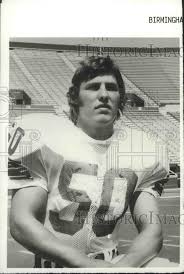Forgotten Giant: The Untold Legacy of Leroy Cook, Alabama’s Lost Legend
Before injuries stole his future and time buried his name beneath a mountain of Crimson Tide legends, Leroy Cook was Alabama’s unstoppable force — a defensive titan whose dominance defined an era. Once hailed as the next great NFL star and a pillar of Bear Bryant’s fearsome defense in the 1970s, Cook’s story is one of brilliance, heartbreak, and a legacy the Alabama faithful should never forget.
In the annals of Alabama Crimson Tide football, certain names echo through Bryant-Denny Stadium with the weight of championships and glory. Namath. Stabler. Ingram. Henry. But some names — though no less important — have faded into the background of history, undeservedly so. One such name is Leroy Cook, the All-American defensive end who once towered over SEC offenses and carried the promise of becoming one of Alabama’s all-time greats.
Cook was not just a player — he was a force.
The Dominance That Defined an Era
Recruited out of Abbeville, Alabama, Leroy Cook joined the Crimson Tide in the early 1970s and quickly became a defensive nightmare for opposing teams. Standing at 6’4″ and 225 pounds — a massive frame for that era — Cook possessed a rare combination of size, speed, and football intelligence. He anchored Bear Bryant’s legendary defenses and was known for wreaking havoc on quarterbacks, disrupting run games, and rallying his teammates with his relentless motor.
By his senior year in 1975, Cook had been named a consensus All-American and was widely considered the best defensive end in college football. He helped lead Alabama to multiple SEC titles, was voted team captain, and was revered by his peers as a quiet leader who let his play do the talking. Scouts had him pegged as a top-5 NFL Draft pick — a surefire future star at the professional level.
The Injury That Changed Everything
Then came tragedy.

On the night of the 1976 Sugar Bowl, mere weeks before the NFL Draft, Cook suffered a devastating knee injury during practice. In an instant, everything changed. Once projected as a first-rounder, Cook plummeted to the 10th round, drafted by the Dallas Cowboys. He never played a down in the NFL. The knee injury was simply too severe, and the sports medicine of that era couldn’t offer what it does today.
In a moment, one of the most feared defenders in Alabama history was forced into the shadows.
A Legacy That Deserves Light

What makes Leroy Cook’s story especially tragic is how quietly he slipped from the Crimson Tide narrative. His name is rarely brought up during discussions of the program’s defensive greats. Despite all his accolades, his All-American status, and his leadership during one of Alabama’s dominant stretches in the ‘70s, Cook has not been fully embraced in the Tide’s ongoing celebration of its heroes.
There is no statue. No jersey retirement. No annual recognition.
The fan base that rallies behind the legends of today has, over time, forgotten a player who could’ve been one of the most iconic defenders in Alabama history — had fate not intervened.
Why Leroy Cook Still Matters
To remember Leroy Cook is to understand the fragility of greatness. His story reminds us that college football legacies aren’t just made in national title games or NFL careers. Sometimes, they are built in the trenches, play after play, year after year — by men whose names should be carved into the program’s stone, not washed away by time.
In an era of NIL deals, social media buzz, and instant fame, Cook’s story is one of humble dominance, quiet sacrifice, and a career tragically cut short before its full bloom. But make no mistake: Leroy Cook was a cornerstone of Alabama football — and it’s time the Crimson Tide family remembers and honors him as such.





























